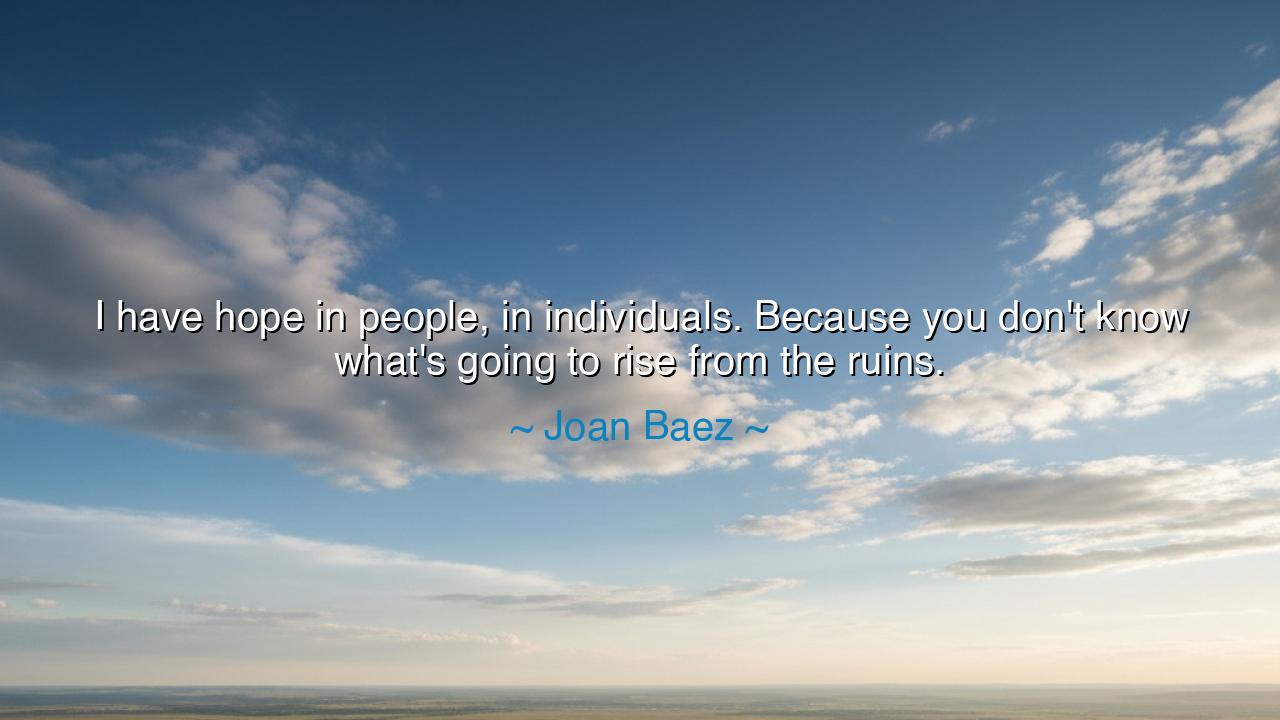
I have hope in people, in individuals. Because you don't know
I have hope in people, in individuals. Because you don't know what's going to rise from the ruins.






Hear now, O listener of truth and endurance, the tender yet unyielding words of Joan Baez, the singer, the protester, the voice of conscience, who said: “I have hope in people, in individuals. Because you don't know what's going to rise from the ruins.” In this saying, she speaks with the quiet fire of one who has witnessed both the breaking and the rebuilding of the human spirit. She reminds us that even when the world seems drowned in despair, there remains within the human heart a spark unextinguished — a hope that refuses to die, for from ruin can still emerge resurrection.
Joan Baez, child of song and struggle, came of age during the storms of the twentieth century. Through her music and her marching, she bore witness to injustice and war, yet she never surrendered to cynicism. She sang beside Martin Luther King Jr., stood against the Vietnam War, and raised her voice for those who could not speak. Her life became an anthem of resistance — not born of blind optimism, but of faith in the individual, in the capacity of the ordinary person to do extraordinary good. When she speaks of “hope in people,” she is not speaking of nations or systems, but of the sacred power sleeping in every human soul — that from the ashes of suffering, something pure and strong may yet rise.
To say that we “don’t know what will rise from the ruins” is to acknowledge the mystery of renewal. History, in its great turning, has always moved between creation and collapse. Empires crumble, cities burn, hearts are broken — yet from their remains, something new is born. The ruins are not merely symbols of loss, but the soil from which new life grows. Baez, wise in sorrow, understands this rhythm: that the same force that destroys can also make way for transformation. The lesson is not to avoid the ruins, but to look into them and wait — for somewhere within their silence, humanity will begin again.
Consider the story of Warsaw, Poland, after the Second World War. The city was reduced to rubble, its streets nothing but dust and broken stone. Yet the people, weary but unbroken, began to rebuild — brick by brick, home by home. Out of devastation arose a city renewed, not identical to the old, but stronger in spirit. It was the will of individuals, not governments, that resurrected it. Baez’s words could well have been written for them — for they, too, believed that from ruin could rise beauty, from despair could grow defiance, and from pain could come purpose.
In every age, the prophets and poets have reminded us of this same truth. The phoenix of the ancients, reborn from its ashes, is but another face of Baez’s hope. The farmer who sows after the flood, the mother who sings to her child after loss, the artist who paints after war — all are manifestations of that divine resilience she praises. Hope in people is not naïve; it is courageous. It dares to see light where all seems lost, to trust that within the chaos of collapse lies the seed of rebirth.
Yet her wisdom is also a challenge. To say “I have hope in people” is to call upon us to be worthy of that hope. It is not enough to wait for heroes to rise from the ruins — we must become them. For the ruins Baez speaks of are not only the cities destroyed by bombs, but the inner ruins of apathy, greed, and despair. Each of us must decide whether to leave the rubble untouched or to build again, with compassion, courage, and creativity. Hope, then, is not a feeling; it is an act. It is the labor of the heart that chooses to believe, to rebuild, and to forgive.
So take this teaching into your soul: when the world around you falls, do not curse the ruins. Walk among them. Listen. There, among the fragments, you will find the beginnings of something new — a kindness, a dream, a voice rising in song. For as Baez reminds us, the story of humankind is not the story of perfection, but of resilience. From every downfall we rise again, from every silence we sing anew.
And thus, O listener, let your hope be like hers — not shallow or fleeting, but rooted in the faith that the human spirit is indestructible. Believe not in the permanence of ruin, but in the unending power of rebirth. For you, too, are part of that mysterious renewal; you, too, can rise from the ashes of your own undoing. And when you do, you will become living proof of Joan Baez’s eternal wisdom — that no ruin is final, and that even from the darkest dust, the light of humanity will bloom again.






AAdministratorAdministrator
Welcome, honored guests. Please leave a comment, we will respond soon